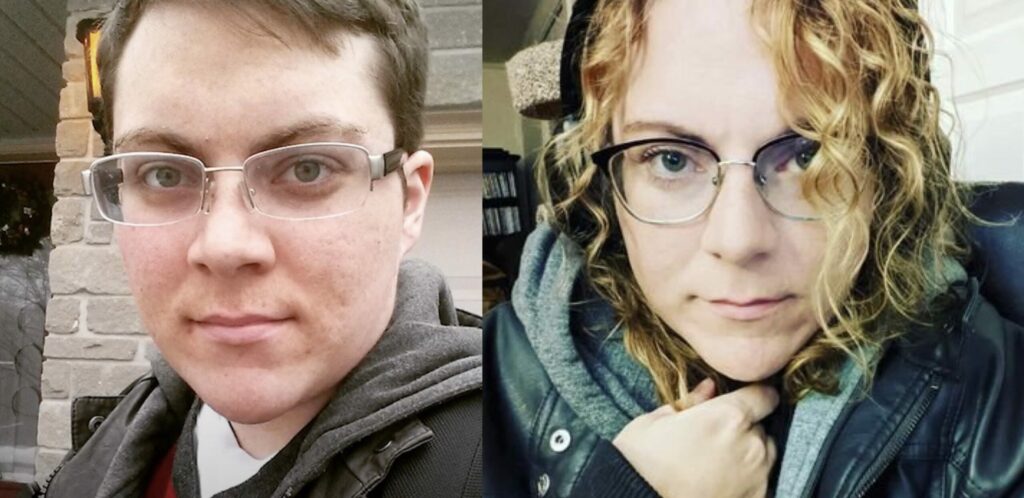Blog Post
A young Canadian woman who had her breasts and womb removed in transgender surgeries is suing the medical professionals who put her on that path
Lawsuits have been launched by victims of the gender cult in both the United States and the United Kingdom. Now, a 34-year-old native of Orillia, Ontario has become the first to file suit in Canada. Michelle Zacchigna had her breasts and womb removed in an attempt to transition to male during a mental health crisis, and she is now suing eight medical professionals who facilitated this “irreversible journey” including psychologists, a psychotherapist, a counsellor, and doctors. The lawsuit was filed in Ottawa. From the National Post:
“Michelle’s stated desire to become transgender was never challenged and it was treated to the exclusion of her other serious mental health issues, closing the door to alternative treatment options,” her statement of claim says. The claim says the defendants “permitted Michelle to self-diagnose as transgender and prescribe her own treatment without providing a differential diagnosis or proposing alternative treatments.”
None of the defendants, who work or worked at various clinics and institutions in southern Ontario, responded to requests for comment on the lawsuit prior to deadline. Four of the defendants have filed notices of intent to defend against the suit in Ontario Superior Court, but no statements of defence have been filed.
Zacchigna said she faces an uphill battle in her lawsuit. “I’ve been under the impression that all medical malpractice suits are challenging. Doctors win the majority of cases in Canada,” she told National Post. “It’s very much a David vs. Goliath undertaking.”
Zacchigna’s case will be challenging for more reasons than that. Fundamentally, this case is taking the entire “affirmative model” to court, regardless of whether that’s how her lawyer argues it. To rule in her favor, a judge would have to call into question the way nearly every major medical institution in the country approaches gender dysphoria—including, for example, the clinic at Toronto’s SickKids hospital. More:
In her statement of claim filed in court in November, Zacchigna says she had difficulty forming relationships with classmates in elementary school and was often bullied. By the time she was 11, she engaged in self-harming behaviour, including cutting her arm with a knife. This continued into early adulthood. When she was 20, she tried to kill herself and she was referred by her family doctor for psychotherapy, where she was treated for social anxiety and clinical depression. She remained unhappy and depressed, and her mental health decline led to her dropping out of university, according to her claim. About a year into therapy, she engaged with an online community around gender nonconformity.
“Michelle came to believe that her biological sex of female did not match her true gender identity of male,” her claim says. “She further came to believe that this mismatch between her biological sex and gender identity was causing her feelings of depression, self-harming behaviour and unease in her body, a mental health condition commonly known as gender dysphoria,” her claim states.
This was the first time Zacchigna felt she was born in the wrong body, and she had not previously identified as male, her claim says. “However, as a result of what she read on the internet, she became convinced that she was a transgender man, and that once she embraced this new identity, her depression would subside.”
Zacchigna started attending a support group in Toronto for people considering gender transition. A counsellor there told her of opportunities to proceed through a medical transition, her claim says. Zacchigna was invited to apply for medical intervention in 2010.
The counsellor wrote a recommendation letter outlining a medical history that didn’t fully match her real past, the claim says. The counsellor didn’t recommend any alternatives, or seek confirmation of Zacchigna’s own diagnosis of gender dysphoria.
Her regular therapist also wrote a recommendation for transition treatment, saying Zacchigna was an “ideal candidate for hormone therapy,” even though the therapist had no previous transgender clients, according to the claim. That therapist’s supervising psychologist supported the therapist’s recommendation without speaking with Zacchigna, she says.
At a Toronto health centre, Zacchigna was prescribed testosterone hormone therapy in 2010 after three appointments. The doctor there became her family physician.
The claim said neither her mental health nor counselling records were consulted and there was no screening “for any other mental health diagnoses or developmental disabilities,” her claim says.
Testosterone therapy continued for three or four years, the claim says.
In 2012, Zacchigna paid to have her breasts removed by a surgeon in Florida, on the recommendation by her doctor, according to the claim.
By 2016, she was “disenchanted” with testosterone, which caused uncontrolled acne. “She no longer cared about the ongoing masculinization of her body,” the claim says.
Zacchigna then sought additional psychological assessment from her original therapist to help her return to university. She was referred to the psychologist supervising the therapist’s practice.
In 2017, in a 25-page report, a psychologist diagnosed her with several conditions, including attention deficiency hyperactivity disorder, borderline personality, clinical depression, autism spectrum disorder, and traits of post-traumatic stress disorder, according to her claim.
“Michelle received these formal diagnoses for the first time nine years after she was formally referred to the (therapist) following her suicide attempt in 2008, and eight years after she first ‘came out’ as transgender in 2009,” her claim says.
The psychologist “did not analyze or consider whether Michelle met the diagnosis for gender dysphoria in her assessment report.”
Nor was that report shared with her family doctor who, in 2017, referred Zacchigna to another doctor to explore hysterectomy surgery.
She had a partial hysterectomy in 2018, asking to keep her ovaries because of her problems with testosterone therapy.
“On or about Nov. 20, 2020, Michelle began to question whether she had ever been transgender, or if she had ever met the criteria for gender dysphoria,” her claim says.
“Since that time, she has commenced a process of detransition towards living life as a woman again.”
Zacchigna claims the defendants moved into delivering transgender therapy without adequately considering other factors.
“The Defendants failed to investigate or failed to adequately investigate and/or confirm that Michelle’s stated desire to transition to the male sex was rooted in a diagnosis of gender dysphoria or resulting from other factors in Michelle’s mental health including her history of clinical depression, anxiety, developmental disabilities, and social difficulties,” her claim says.
If alternatives were pursued, the claim says, Zacchigna could have ”learned to live with her body without surgical or hormonal treatments.
“Michelle has struggled to come to terms with the permanent changes from her hormone treatments and hysterectomy surgery have caused: a low voice, male-pattern balding, facial hair, an enlarged clitoris, a flat chest, and the inability to ever become pregnant. All of this has caused her to suffer from a worsening of her depression,” her claim says.
Zacchigna seeks $350,000 in general damages for pain, suffering and loss of enjoyment of life plus an undetermined amount for past and future loss of income, past and future medical treatment, and other expenses and costs. She also seeks a return of the money billed by doctors to the Ontario Health Insurance Plan. The claim says a more precise accounting will be provided prior to any trial on the matter, which would likely be a year or more away.
If Zacchigna were to win her case, it would shake Canada’s transgender medical industrial complex to its foundations. To validate her claims would be to question current foundational assumptions shared by the collective Canadian elites. That being said, the coverage of this case alone makes it tremendously valuable—a canary in the coal mine that will hopefully begin to give some politicians and others the courage to speak out and question some of these new “norms.” As we saw with the case of Keira Bell in the UK, it took one case to put the first hairline cracks in the gender consensus—and since then, we’ve seen more and more voices joining hers in telling their stories and questioning the transgender narrative. It shouldn’t be a big deal that the prime minister of the UK stated that a woman is an “adult human female,” but in a culture that views that as hate speech, it unfortunately is.
Perhaps Michelle Zacchigna will be Canada’s Keira Bell. I certainly hope so.








